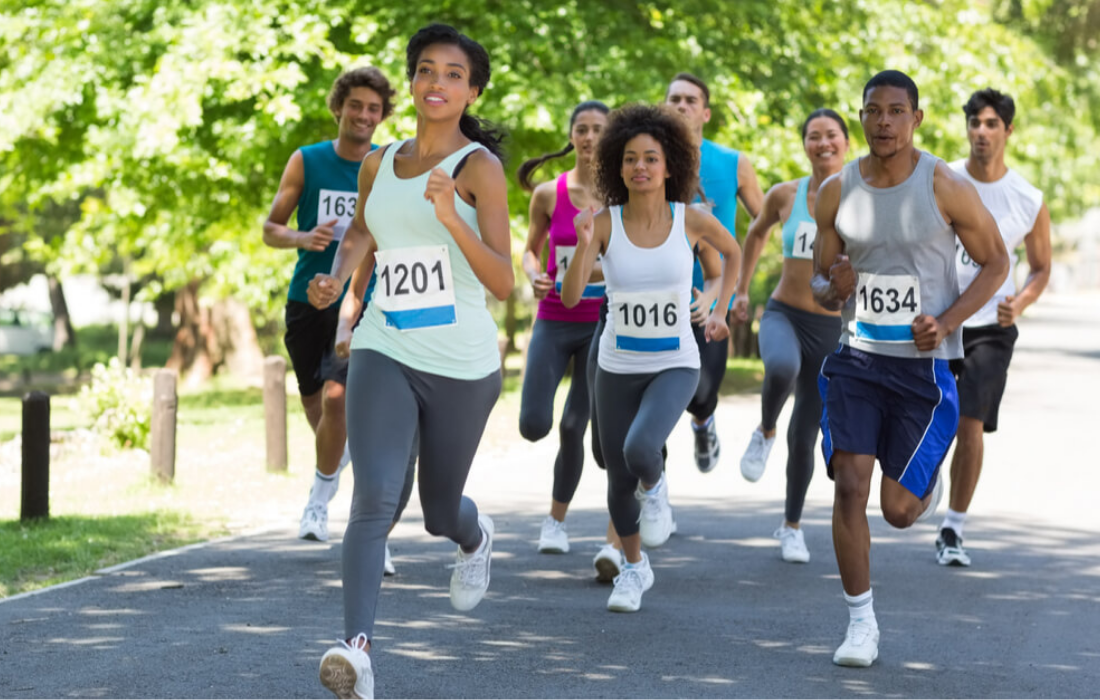8 Tips for Runners to Stay in Shape

It is well known by those who spend time running—whether done recreationally or professionally—that it is a high-impact exercise that makes a lot of demands on the body. However, as a runner, you also know that running is rewarding in a lot of ways, including:
- Helping with balance, stability and coordination
- It’s a weight-bearing activity, which improves bone density
- Increasing your heart rate to help burn calories
- Relieving stress
- Strengthening the lungs and heart
So, to make sure you maintain the balance your body needs to thrive, here are some important tips to stay in shape while participating in this worthwhile sport.
Treat carbohydrates like muscle fuel.
In a world where we’re told carbs are bad for us, it may be hard to believe that carbohydrates are beneficial in any way. But, for runners and other avid athletes, carbs are the primary source of energy for the muscles during moderate to intense exercise. They produce what is known as glycogen, a substance that the body stores in the muscles and liver to be used as energy when needed—such as during strenuous, sudden bursts of activity—to help maintain glucose (blood sugar) levels in the body.
Some carb options to incorporate into your diet include:
- Baked and sweet potatoes
- Bread
- Fruits and vegetables
- Hot cereals
- Oatmeal and other grains
- Pastas
- Rice
Pack in the proteins.
Protein helps build muscle, so it’s important to include it in your diet to help with muscle growth and recovery after a long run. Consider adding some lean proteins, such as turkey or fish, and protein-rich veggies like beans, tofu and leafy greens (e.g., broccoli, spinach). You may also want to consider cheese and nuts.
Stay hydrated.
Everybody knows that staying hydrated is important, but those who have any kind of rigorous workout or are looking to train for an event must be very conscious of how hydrated they are both before as well as during an event. An average person needs to drink half their body weight in ounces of water, but an athlete needs even more. Drinking 90 to 128 ounces of water would not be uncommon for an active athlete.
Replenish your electrolytes.
Electrolytes help keep your body balanced and can prevent cramping. You can find electrolytes naturally occurring in coconut water as well as in sports drinks. Just be careful with sugary sports drinks—the last thing you need as an athlete is a burst of energy from sugar, only to find yourself crashing shortly afterward.
Know how to enhance your stride.
Your running speed is determined by two things: Your stride rate (number of strides per minute) and stride length. According to Running Well by Sam Murphy and Sarah Connors, the best way to enhance your stride is by staying strong and flexible. Consider doing some giant walking lunges to help develop hip mobility or some plyometrics training—also known as jumping drills—to improve the way your body uses the energy produced during high-impact activity.
Get some resistance training in.
Runners need resistance training too! Weighted exercises using machines, dumbbells or your own body weight are all an excellent addition to a runner’s program. As a runner, you wouldn’t use heavy weights, but rather moderately challenging weights with higher repetitions (about 15 to 20) and a few sets of each exercise.
Warm up by walking backward.
Did you know that walking backward is a great way to fire up your glute muscles? It is important to do a dynamic warmup prior to any race to ensure you are recruiting all the necessary muscles for a successful and injury-free race.
Always take the time to loosen up afterward.
One of the easiest ways to prevent injury is to take a few minutes to stretch after rigorous training or a run. Consider doing hip flexor stretches, thigh stretches calf and hamstring stretches to help your muscles, tendons and ligaments cool down.
For more great tips or to inquire about a conditioning program, contact the sports specialists at University Orthopaedic Associates today!

